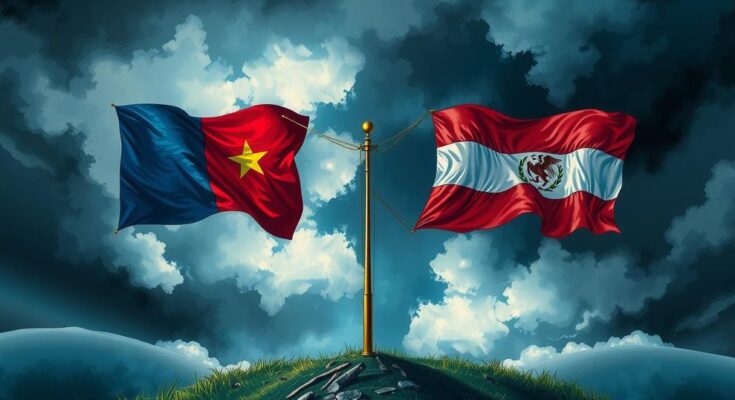Venezuelan President Nicolas Maduro accused Guyana’s President Irfaan Ali of provoking an armed conflict, comparing him to Ukrainian President Volodymyr Zelensky. This accusation follows a Venezuelan patrol’s incursion into disputed waters, threatening ExxonMobil operations. The ongoing territorial dispute over the Essequibo region intensifies geopolitical tensions, prompting warnings from the U.S. government regarding further provocations by Venezuela.
Nicolas Maduro, the President of Venezuela, has accused Irfaan Ali, the President of Guyana, of attempting to incite an armed conflict, drawing a parallel between him and Ukrainian President Volodymyr Zelensky. These remarks followed a recent incident where a Venezuelan patrol vessel entered waters claimed by Guyana, posing a threat to ExxonMobil’s offshore operations.
In a televised address, Maduro claimed, “The Government of Guyana has adopted a war plan against Venezuela,” asserting that they believe an armed conflict would be advantageous. He further referred to Ali as the “Zelensky of the Caribbean,” reiterating this sentiment in a statement from the Venezuelan Foreign Ministry, which condemned Ali’s claims regarding the maritime incident as both “baseless” and “blatant lies.”
Tensions escalated when Guyana reported that a Venezuelan coast guard patrol encroached on its territorial waters, approaching an ExxonMobil vessel. This incident intensified an ongoing territorial dispute over the Essequibo region, a substantial area controlled by Guyana for over a century. The U.S. State Department responded firmly, indicating that continued provocations from Venezuela would lead to consequences for Maduro’s regime.
The reference to Zelensky appears strategically aimed at the United States, especially following a recent meeting between the Ukrainian leader and President Donald Trump. Analysts suspect that Maduro’s government is attempting to escalate tensions to provoke a shift in U.S. policy towards Venezuela.
Research conducted by the Center for Strategic and International Studies highlighted that Maduro might be using the Essequibo dispute to strengthen domestic support while gauging international reactions amidst a changing U.S. stance. The report notes that Maduro’s actions signal his capability to destabilize regional interests if pressured by the United States.
The protracted dispute over the Essequibo, rich in resources, has historical roots dating back over a century. Following a December 2023 referendum, Maduro claimed overwhelming support to use military force in the dispute, although the legitimacy of this vote has been questioned due to allegations of electoral manipulation by his regime.
In summary, the tension between Venezuela and Guyana over the Essequibo region continues to escalate. Maduro’s recent comments liken Guyana’s President to Zelensky, highlighting geopolitical maneuvering amid allegations of provocation. The potential for conflict raises significant concerns and has drawn warnings from the United States, further complicating the political landscape in the region. Ultimately, the unfolding events reflect deep-rooted historical disputes and shifting international relations, particularly regarding U.S. policy on Venezuela.
Original Source: www.miamiherald.com




